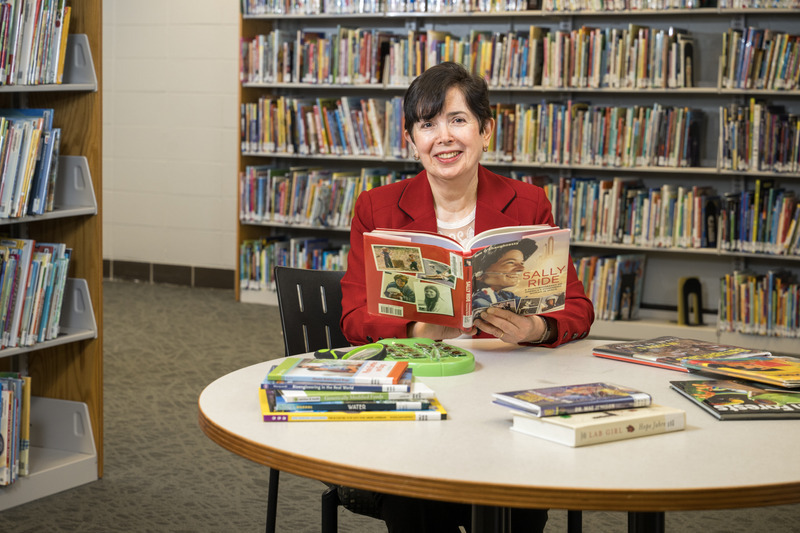


Lifetime achievements in science education
Photos by Kathy F. Atkinson and courtesy of Nader Makarious March 31, 2025
UD Professor Zoubeida R. Dagher receives lifetime achievement award from the International History, Philosophy and Science Teaching Group
Zoubeida R. Dagher, professor in University of Delaware’s College of Education and Human Development (CEHD), remembers the childhood joy she felt as she helped her brother with his homemade “inventions” and conducted science experiments using the pages of Children’s Digest as her guide. These early experiences piqued Dagher’s curiosity, but also helped her understand scientific inquiry as a deeply personal, social and empowering endeavor.
“Science gives us tools and knowledge to understand how things work, which is empowering for both teachers and learners,” said Dagher, who specializes in science education in CEHD’s School of Education. “Teaching science in a personally and socially relevant manner empowers learners to seek credible evidence, identify questionable claims and become scientifically literate citizens.”
Since joining UD in 1989, Dagher has dedicated her career to research and teaching that has profoundly impacted science education in Delaware and across the globe. In recognition of her distinguished contributions, she has received a Lifetime Achievement Award from the International History, Philosophy and Science Teaching (IHPST) Group.
Science in context
Dagher’s contributions to science education counter traditional methods that teach science in isolation from personal, social or political contexts. Rather than asking her students to leave their personal beliefs at the door, Dagher encourages them to ask questions like: “What role do my personal values play in my investigation?” and “What real-world impact might my findings have on my community?”

“In my research, I have been fortunate to collaborate with my colleague Sibel Erduran at the University of Oxford on developing a framework that emphasizes the inclusion of the cognitive, epistemic and social-institutional dimensions in science education,” said Dagher, who is also a faculty fellow in UD’s Center for Science, Ethics and Public Policy. “This framework counters the dominant ways of teaching science that sideline its human and social-institutional elements. In other words, science doesn’t happen in a vacuum. The contextual understanding of science is important for developing scientifically literate citizens who are better able to understand and navigate science-society controversies.”
Dagher uses insights from scientific epistemology — a branch of philosophy that examines the nature, scope and limitations of scientific knowledge — to help science teachers and students understand scientific methods and practices, develop critical thinking and problem-solving skills and navigate tensions between personal beliefs and scientific findings.
“My work is guided by a deep respect for teachers and the teaching profession, modesty about what I know, eagerness to learn more, curiosity about teaching and learning spaces and excitement about the endless possibilities that teaching and research open up,” Dagher said.
With this lens, Dagher has co-authored books and articles on reconceptualizing the nature of science in K-12 curriculum, science education in Arab states, the portrayal of scientists in biographies written for children, public engagement with science during the COVID-19 pandemic and more.
“Professor Dagher’s groundbreaking book, Reconceptualizing the Nature of Science for Science Education, has been cited about a thousand times and has clearly impacted the field as a whole by exploring science as a cognitive-epistemic and social-institutional system,” said John R. Jungck, professor of biological sciences and mathematical sciences in UD’s College of Arts and Sciences. “The range of her scholarship extends from how Mendel's research became one of the very few recognized ‘laws’ of biology to citizen science to practical implementations: textbooks, teacher education courses, curriculum policy documents and generative visual tools.”
Mentoring the next generation of science educators
At UD, Dagher teaches within CEHD’s K-8 teacher education, Ph.D. in education and Ed.D. in educational leadership programs, mentoring the next generation of science educators and school leaders. In line with her research, she takes a student-centered approach, prioritizing the personal experiences they bring to the classroom.
“When working with preservice teachers, I want them to experience the care involved in setting up student-centered science lessons, the value of customizing high-quality teaching resources and the joy of using effective strategies to support their students’ sensemaking and problem solving,” Dagher said.

According to Dagher’s former students, she has achieved that goal. Anna O’Brien, now a sixth-grade science and special education teacher in New Jersey’s Bridgewater-Raritan Regional School District, identifies Dagher as a great influence in her teaching.
“Zoubeida is very passionate about science education and it comes through in her teaching,” O’Brien said. “I am definitely a stronger science teacher because of her guidance. Her teaching has helped me to create lessons and science curriculum that follow not only best practice but push students to think more deeply and connect what they learn in class to the real world.”
Michael Valenti, science department chair and science instructor at the Charter School of Wilmington, similarly describes Dagher as a valued mentor.
“Zoubeida has been one of the most supportive and insightful mentors in my journey as a science educator,” Valenti said. “Her kindness, empathy and deep knowledge of science education and curriculum development not only helped me grow as a researcher, but also shaped how I approach teaching. Our shared passion for science education and meaningful curriculum design made her guidance especially impactful, and I truly could not have completed my doctoral work in the educational leadership program without her.”
In addition to receiving the IHPST Lifetime Achievement Award, Dagher was recognized as an American Association for the Advancement of Science fellow in 2019. Throughout her career, she has also held several leadership positions, including IHPST president and deputy dean in the College of Education at Qatar University.
To learn more about research in science education, visit CEHD’s STEM education research webpage.
Contact Us
Have a UDaily story idea?
Contact us at ocm@udel.edu
Members of the press
Contact us at 302-831-NEWS or visit the Media Relations website

